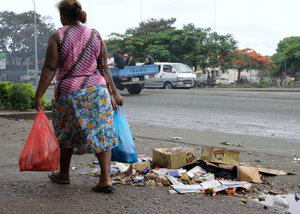Advertisement
Published: March 12th 2010

 Good morning Honiara
Good morning Honiara
Every morning, I found this pile of garbage near the Westpac bank. Later, a team of ladies would come and clean it up.In 2003, the Australian-led
Regional Assistance Mission to the Solomon Islands (
RAMSI) arrived in Honiara. Foreign troops and police quickly stopped the violence, restored security and disarmed the militias. RAMSI's nation-building efforts, however, have been less effective. Australia is now trapped in the Solomon Islands for the long haul. A new strategy is required and I propose a more decentralised government.
For all its troubles, the Solomon Islands receives much foreign aid and assistance. Like many developing nations, the Government has become aid-dependent.
2008 estimated GDP for the Solomon Islands was US$642 million (nominal GDP).
Australian aid was A$223 million (approximately US$180 million), with RAMSI taking 58 percent. Much of RAMSI's work is
not building capacity but mundane administration, supporting a sleepy public service and selfish politicians. Honiara had not improved since my previous visit in 2007. I did not see new developments on the islands. Where does the money go? The aid? The logging royalties? Taxes and duties?
Money from Taiwan?
Melanesian nations are handicapped by weak political parties, unstable coalitions and centralised governments that neglect the majority rural population. Melanesia is extraordinarily ethnically diverse. Xenophobia and nepotism are strong Melanesian cultural traits to this day. Politicians and officials have a duty to look after

 Marovo Lagoon
Marovo Lagoon
Honiara might have money but the islands have beauty.family first, village second, island third and nation last. You can depend on your family but, as recent history shows, you can't depend on the Solomon Islands Government. Why then do Solomon Islanders repeatedly complain that their Government is not doing enough? They know that their Government is ineffective but are still hopeful of getting something for free.
If people really want change, they need to make change. A peaceful and happy Solomon Islands can be rebuilt from the bottom-up. The top-down approach of RAMSI is misguided and attempts to prolong a colonial-era administrative system. A more decentralised Government would be a fairer system, where rural people have greater control over their destiny. Local issues are best addressed locally. Strengthening of traditional leadership and respect is a good first step. Solomon Islanders should not wait for the Government and RAMSI to deliver promised services. But are there any benevolent leaders?
Advertisement
Tot: 0.093s; Tpl: 0.008s; cc: 6; qc: 51; dbt: 0.0465s; 1; m:domysql w:travelblog (10.17.0.13); sld: 1;
; mem: 1.1mb

 Good morning Honiara
Good morning Honiara
 Marovo Lagoon
Marovo Lagoon